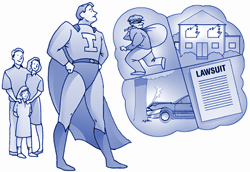All material on this page comes from two books, Property-Casualty Principles and Principles Of Life Insurance, published by BISYS Education Services.
How insurance helps people
Insurance Helps People Stay Financially Stable
In a very obvious and personal way, insurance makes life better. People who buy insurance gain some very valuable benefits in terms of financial stability and in the form of help in recovering from and preventing losses and in obtaining credit. Let’s look first at the benefit of financial stability.

Think of the financial consequences that you (and everyone else) could face without insurance. Say you have an accident on your way to work tomorrow and damage your car extensively. Could you pay a $5,000 repair bill right now? Or, if your home or apartment should burn down today, could you easily come up with the thousands of dollars you’d need to rebuild and buy new furniture and personal effects? If you’re like most of us, that would be really tough, if not impossible; it could be disastrous.
But let’s look at the bright side. With your car and your home or apartment insured, you’ll get your money back for those losses. So, however unfortunate events such as these may be in other ways, your finances won’t be drained, and you and your family’s financial stability won’t be undermined. You’ll be able to keep your present lifestyle, and your future plans–to buy a newer car or a more expensive home, to send your children to college, to enjoy a comfortable retirement–can remain intact.
Insurance helps communities prosper
Help In Recovering From Ordinary Losses
People can benefit from insurance even if they don’t own it themselves. In fact, everyone benefits from insurance.
Here’s an example. A fire destroys a local business. The business isn’t insured, so the owners could lose everything. A lot of people depended on that business. If it no longer exists:
- the employees will lose their jobs;
- the business’ suppliers will lose money, and may have to cut back their own work forces or drop their plans for expansion;
- the community will lose tax revenues that the business and its employees were paying. Those funds now won’t be available for essential government services such as water and sewer, fire protection, and police protection;
- customers won’t be able to buy the business’ products or services. If the business supplied essential components to other businesses, those businesses may have to curtail their operations.

Help Recovering From Catastrophic Losses
We’ve discussed the “ripple effect” that the loss of a single business can have. Now think of the long-term and widespread devastation caused by events such as hurricanes or earthquakes. Imagine the losses that would result from those catastrophes if there were no such thing as insurance. It would take many years for areas of the country to rebuild after a natural disaster if it weren’t for the revitalizing power of the insurance money paid to cover those losses. Meanwhile a region would sink into an economic slump, and even cause a drag on the economy of the nation as a whole.

Preventing Losses
The insurance industry is constantly working to prevent losses from occurring. In fact, insurance loss prevention activities in North America date back to colonial times.

Benjamin Franklin formed the first fire insurance company in the United States in 1752. He then organized efforts to educate people about the ways they could keep their homes free of fire. He invented two things that help reduce the incidence of house fires: the lightning rod and the Franklin stove. And, he established Philadelphia’s first volunteer fire department.
Insurance companies continue this tradition today. In addition to insuring businesses, they employ loss control specialists and engineers to inspect a business’ premises and make appropriate recommendations for improving workplace safety and for preventing crime, fire, or other perils (a peril is anything that causes a loss). Some businesses buy insurance as much to obtain loss prevention services as for the insurance coverage. Some insurance companies also encourage loss prevention by offering discounts to insureds who have certain safety equipment or fire or crime prevention devices installed in their homes, cars, or businesses.
Insurance industry trade associations and groups of companies contribute funds to many organizations that promote safe products, safe workplaces and safety in the home and on the road. Organizations devoted to preventing fires and many types of crime also receive funds from insurance industry sources.
Insurance industry groups participate in campaigns to raise public awareness about safety and crime prevention and to enact legislation to reduce hazards such as drunken driving.
Loss prevention contributes greatly to the quality of our lives, since it spares us not only financial loss but also the accompanying physical and emotional suffering from events such as an accidental injury or the loss of a home or other property to fire, criminal act, or other peril.
Insurance Contributes To Our Economy As An Employer,Taxpayer And Investor
As an employer: Insurance companies, agencies, and service organizations employ over 2,000,000 individuals in various capacities. Every year, these individuals earn a total of more than $75 billion. Another half million people are employed by companies that supply the computers, office equipment, and other goods and services the insurance industry needs to conduct business.
As a taxpayer: The insurance industry is a major source of revenue for both the federal government and the individual states. Premium taxes paid to the states total nearly $8 billion a year. The amount of income taxes paid to the federal government fluctuates depending on changes in tax rules and operating results, but the figure for property-casualty insurance companies alone has ranged between $1.5 billion and nearly $5 billion in recent years.
As an investor: Without the investments made by the insurance industry, private companies and governments at all levels would have a harder time finding the money required to finance their operations. The insurance industry has over $2 trillion invested in the public and private sectors of the economy. Of that amount, about $500 billion is invested in U.S. government securities, and over $150 million is invested in state and local government securities. Over $1 trillion is invested in corporate securities, with the remainder in other types of investments, such as real estate and money market instruments.
Insurance Helps People Obtain Credit
Being able to obtain credit is essential if our economy is to flourish. Without credit, most people couldn’t buyhomes or cars or make other major purchases, and without demand for those products, our economic engine would stall. Without credit, most businesses couldn’t start, much less expand, their operations, and many jobs simply wouldn’t be created. Without jobs, people wouldn’t have the money to buy goods and services. Credit improves the quality of life and makes it possible for people to obtain many goods and services sooner than would be possible if they had to pay cash for them.

How does insurance fit into the credit system? An example will help explain. Let’s say you want to buy a house. It costs $50,000. You only have $10,000, so you borrow $40,000 from a bank. The $40,000 loan gives the bank a financial interest in your house. That is, in order to help assure that you can pay back the $40,000, the bank wants to make sure that nothing happens to your house. What if your house burned down? The bank would lose $40,000!
When it lends you the money, then, the bank will ask you to insure your house. The policy will be written so that if the house is destroyed, the bank will be paid the amount of its financial interest in the house, which will decrease as you make payments on your loan. You will receive the balance of the benefits. The insurance policy protects the bank against loss. The same principle works to help people get car loans and to help businesses get money to expand. Insurance works hand-in-hand with credit to maintain our nation’s prosperity and standard of living.
Insurance Protects Against The Financial Consequences Of Death
The financial consequences of death can be very formidable. We won’t dwell on the emotional consequences–the loss of a loved one and the ensuing bereavement. Nothing can replace a spouse or life partner, a parent or child, a brother or sister. But the practical and financial consequences of death are another matter. Without life insurance, surviving dependents can suffer extreme financial hardships as a result of an individual’s death. There’s the possible loss of income as well as a number of sudden expenses that come as a result of death.
Obligations At Death
We frequently hear about the high cost of living, but dying can be expensive too. These are costs that must be met soon after death. How much will they amount to? That depends upon the individual.
Funeral Expenses

Funeral costs can vary widely depending upon the type of service, area of the country and other factors. According to the National Funeral Directors Association, the average cost of a funeral today is $4,500. In addition to the cost of the funeral, there are also burial expenses (if separate); expenses of a tombstone, monument or mausoleum; the cost of the burial plot; the cost of transportation if death has occurred away from home; florist’s fees; and prepaid expenses for future care of the burial site. Whatever the cost, it will most certainly increase over time due to inflation.
Administration Expenses

These include the cost of opening, administering and closing the decedent’s estate. Executor’s fees and fees for the executor’s attorney will make up most of this cost. Other expenses may include court or probate costs; the cost of appraising estate property; the cost of insuring estate property while the estate is open; maintenance or repair of estate property, particularly if it is to be sold; the cost of defending a will if it should be contested by disgruntled heirs; auctioneer’s fees and so on. The larger and more complex a person’s holdings, the larger the administration expenses will be. But even modest estates may incur significant administration expenses.
Debts

This could be another major cost. It includes automobile loan balances, credit card balances, promissory notes, bank loans, margin account balances with stock brokers and final expenses of the decedent’s last illness–medical expenses that might not be covered by Medicare or insurance. Accrued taxes may also be considered debts of the decedent. This would include unpaid income taxes (federal, state and local), property taxes, and any other taxes that the decedent had incurred but not paid. How much this all might amount to will vary. It could be a little; or it could be a lot.
Estate Taxes

Death taxes–federal and state–are yet another cost. Such taxes are especially important in large, unplanned (or poorly planned) estates. The federal estate tax rates are progressive. The larger the estate, the higher the tax–as much as 55%. This tax generally must be paid in cash within nine months of death.
State inheritance and estate taxes vary widely. In a small estate, they may be a greater problem than the federal estate tax.
A Secure Future
These obligations may only be the beginning. In most cases, there are also obligations that extend into the future–security for those left behind. There may be a spouse who needs living expenses, mortgage payments to be made or children to raise and educate. If the deceased was an income earner, surviving dependents will have to manage without that income. If the deceased stayed at home with the children, the surviving partner will likely face substantial increases in expenses to replace the deceased’s contributions to the family lifestyle.
No matter how many or what kind of obligations an individual leaves at death, there’s only one thing that will satisfy them–money. For this reason, a person who wants to relieve his or her family of these obligations will plan to leave them with an estate–money sufficient to cover all these needs.